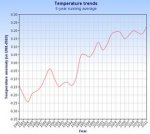- Joined
- Jan 28, 2013
- Messages
- 94,823
- Reaction score
- 28,342
- Location
- Williamsburg, Virginia
- Gender
- Male
- Political Leaning
- Independent
A new paper from Dr. Marcia Wyatt and Georgia Tech's Dr. Judith Curry, published in Climate Dynamics, may point to improved climate models and projections. eace
eace
New paper from Dr. Judith Curry could explain ‘the pause’
Posted on October 10, 2013 by Anthony Watts
From the Georgia Institute of Technology
‘Stadium waves’ could explain lull in global warming
 This is an image of Dr. Judith Curry, chair of the School of Earth and Atmospheric Sciences at the Georgia Institute of Technology.
This is an image of Dr. Judith Curry, chair of the School of Earth and Atmospheric Sciences at the Georgia Institute of Technology.
One of the most controversial issues emerging from the recent Intergovernmental Panel on Climate Change (IPCC) Fifth Assessment Report (AR5) is the failure of global climate models to predict a hiatus in warming of global surface temperatures since 1998. Several ideas have been put forward to explain this hiatus, including what the IPCC refers to as ‘unpredictable climate variability’ that is associated with large-scale circulation regimes in the atmosphere and ocean. The most familiar of these regimes is El Niño/La Niña, which are parts of an oscillation in the ocean-atmosphere system. On longer multi-decadal time scales, there is a network of atmospheric and oceanic circulation regimes, including the Atlantic Multidecadal Oscillation and the Pacific Decadal Oscillation.
A new paper published in the journal Climate Dynamics suggests that this ‘unpredictable climate variability’ behaves in a more predictable way than previously assumed.
New paper from Dr. Judith Curry could explain ‘the pause’
Posted on October 10, 2013 by Anthony Watts
From the Georgia Institute of Technology
‘Stadium waves’ could explain lull in global warming
 This is an image of Dr. Judith Curry, chair of the School of Earth and Atmospheric Sciences at the Georgia Institute of Technology.
This is an image of Dr. Judith Curry, chair of the School of Earth and Atmospheric Sciences at the Georgia Institute of Technology.One of the most controversial issues emerging from the recent Intergovernmental Panel on Climate Change (IPCC) Fifth Assessment Report (AR5) is the failure of global climate models to predict a hiatus in warming of global surface temperatures since 1998. Several ideas have been put forward to explain this hiatus, including what the IPCC refers to as ‘unpredictable climate variability’ that is associated with large-scale circulation regimes in the atmosphere and ocean. The most familiar of these regimes is El Niño/La Niña, which are parts of an oscillation in the ocean-atmosphere system. On longer multi-decadal time scales, there is a network of atmospheric and oceanic circulation regimes, including the Atlantic Multidecadal Oscillation and the Pacific Decadal Oscillation.
A new paper published in the journal Climate Dynamics suggests that this ‘unpredictable climate variability’ behaves in a more predictable way than previously assumed.

